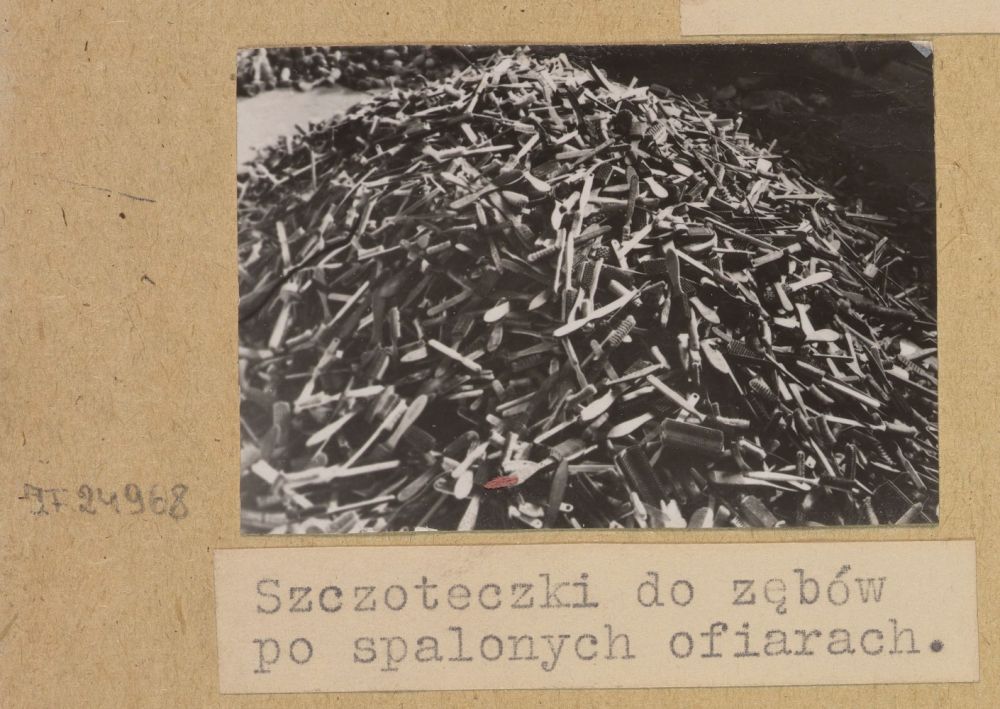- News
- Events
- Oneg Shabbat
- Collections
- Research
- Exhibitions
- Education
- Publishing Department
- Genealogy
- About the Institute
- Bookstore


Toothbrushes of those murdered at Auschwitz, 1945 / Polona
On January 12, 1945, the Red Army launched a large offensive, the so-called the Vistula-Oder operation, aiming to reach the immediate vicinity of Berlin. The Soviet troops quickly captured Warsaw (January 17), Krakow (January 18), Łódź (January 19), and on January 27, the Soviet 60th Army liberated KL Auschwitz. About 230 Soviet soldiers died in skirmishes in the area of the camp.
It was not the first extermination camp liberated by the Red Army – in July 1944, the Soviet army seized Majdanek near Lublin, a concentration camp and extermination center, where about 78,000 people were murdered. The camp was partially destroyed by the Germans trying to cover up the traces of the crimes. According to the plans of the SS, Auschwitz was also to be destroyed and deserted.
Already at the turn of 1944 and 1945, about 65,000 prisoners of Auschwitz were deported to Germany, where they were to continue forced labor. In mid-January 1945, the SS led death marches from the camps within the reach of the Soviet troops – in case of Auschwitz and its sub-camps, it was about 56,000 people. Hungry, walking in thin striped uniforms in even twenty-degree frost, prisoners died by thousands of exhaustion or were murdered by SS men and German soldiers. Several thousand exhausted prisoners did not survive the marches..
![ruiny_komory_gazowej_polona.jpg [765.20 KB]](https://www.jhi.pl/storage/image/core_files/2021/1/27/56ac11ac22c0bed0aad2ba25946bcaf2/jpg/jhi/preview/ruiny_komory_gazowej_polona.jpg)
Due to the rapid advances of the Red Army, the Germans did not manage to destroy Auschwitz and the camp remained largely intact. SS men dismantled or blew up only the gas chambers and three crematoria (II, III and V), they also set fire to the warehouses with property taken from the victims and the documents remaining in the camp.
About 7-9,000 prisoners remained in the camp – Jews, Poles, Russians, Belarusians, Ukrainians, Yugoslavians.
Primo Levi wrote:
“The first Russian patrol arrived near the camp on January twenty-seventh, 1945, around noon. Charles and I saw them first as we were carrying the bodies of Sómogyi, who died first in our room, to the joint grave. (…) Charles took off his cap to greet the living and say goodbye to the dead.
The four young soldiers on horses rode cautiously, submachine guns in hand, along the road leading around the camp. They stopped beside the barbed wire fence and looked at it, exchanging short, soft words. They looked with some strange embarrassment at the decaying corpses, at the torn-apart barracks and at us, the few alive.
To us they seemed wonderfully flesh and real, suspended – the road went over the camp grounds – on their enormous horses between the gray of snow and the gray of the sky, motionless in the gusts of a dangerous, wet wind, which announced a thaw ”.
On January 28, Poles sent by the Russians came to the camp and began cleaning its area – first of all, taking out the corpses of prisoners lying in the snow. “From the next day, we saw other Polish girls bustling about the camp grounds, pale with pity and disgust: they washed the sick and roughly dressed their wounds. They also lit a huge fire in the middle of the camp, using wood from the broken barracks, and cooked soup on it in every dish they could find”. “Death did not stop its harvest: the sick died by the dozen on cold bunks, on the muddy streets they fell here and there, as if struck by lightning, the most voracious of us, who, obeying blindly the imperious dictates of old hunger, ate excessive amounts of meat, which was supplied irregularly by the Russians still fighting on the front; sometimes we got little, sometimes not at all, other times in wild abundance”.
*
The main theme of the 76th anniversary of the liberation of Auschwitz will be the fate of the children imprisoned and murdered there. Over 200,000 children were murdered in the camp, over 90% of them were Jewish.
Due to the coronavirus pandemic, the celebration will take place on the Internet.
Since 2006, 27 January has been celebrated as the International Holocaust Remembrance Day. Check out the program of international virtual celebrations in 2021.
Sources:
Jacek Lachendro, Wyzwolenie obozów zagłady Auschwitz [Liberation of the Auschwitz extermination camps], the interview was conducted by Łukasz Wojtach, https://muzhp.pl/pl/e/1719/wyzwolenie-obozow-zaglady-auschwitz, accessed on 27/01/2021.
Primo Levi, Rozejm [Truce], transl. by Krzysztof Żaboklicki, Kraków 2009, pp. 8, 15-16.